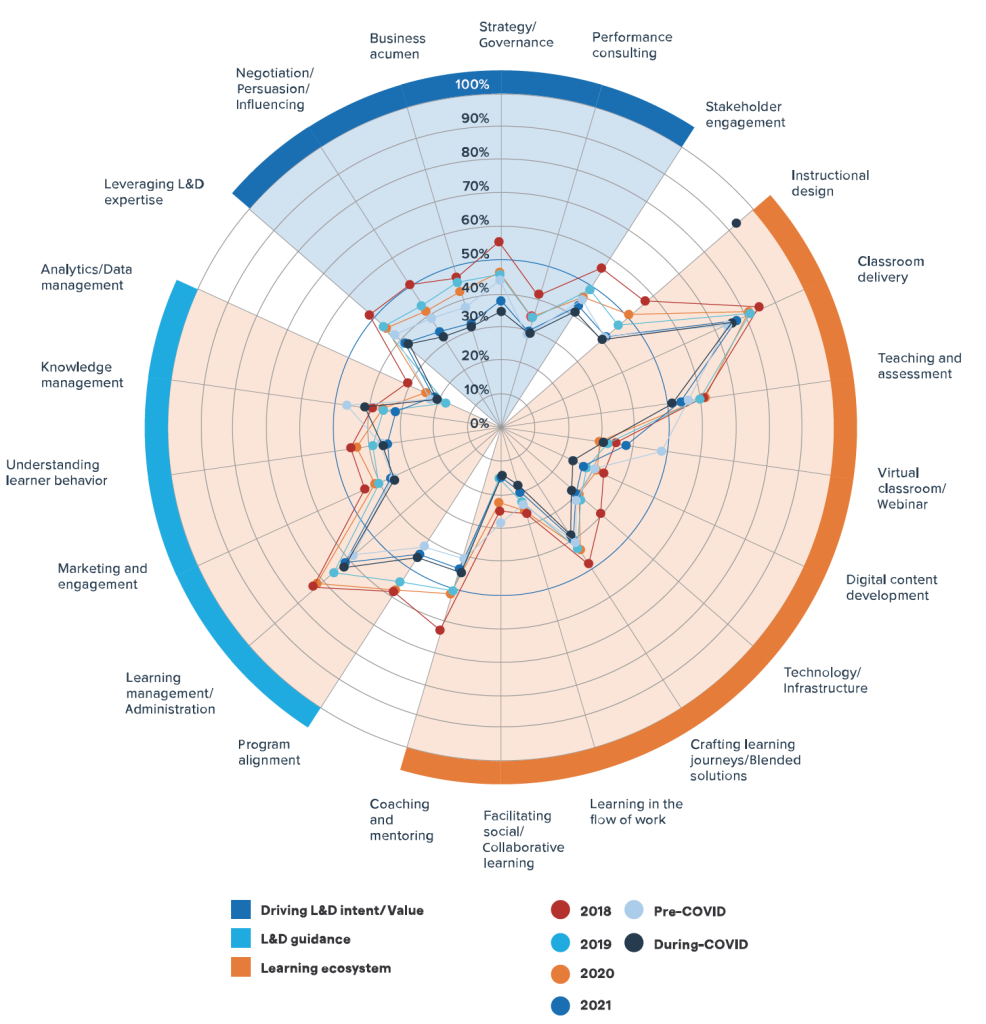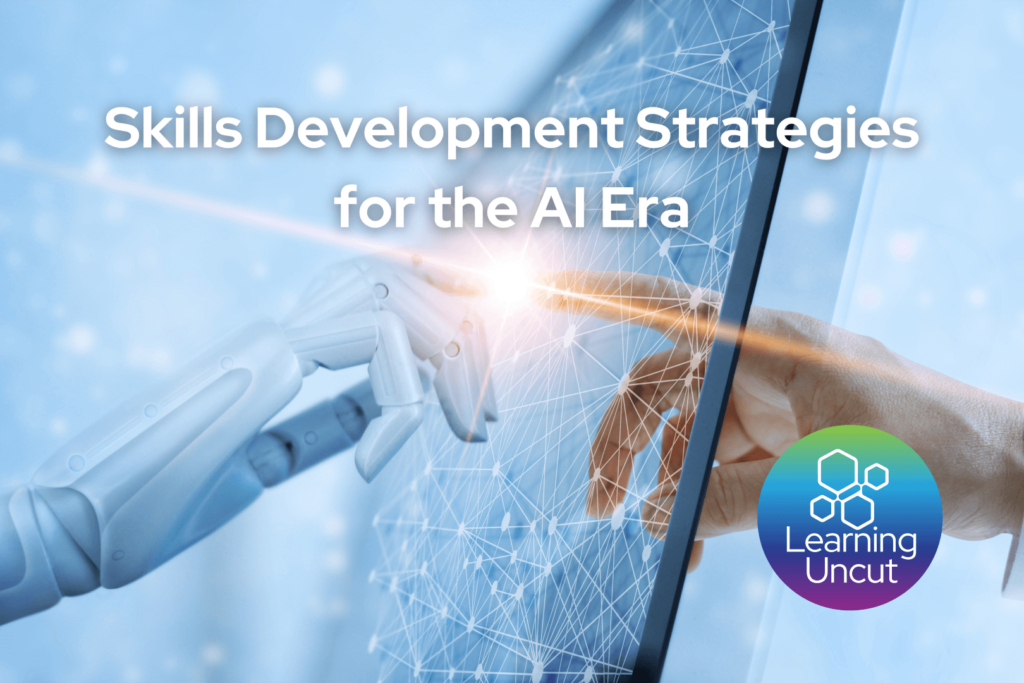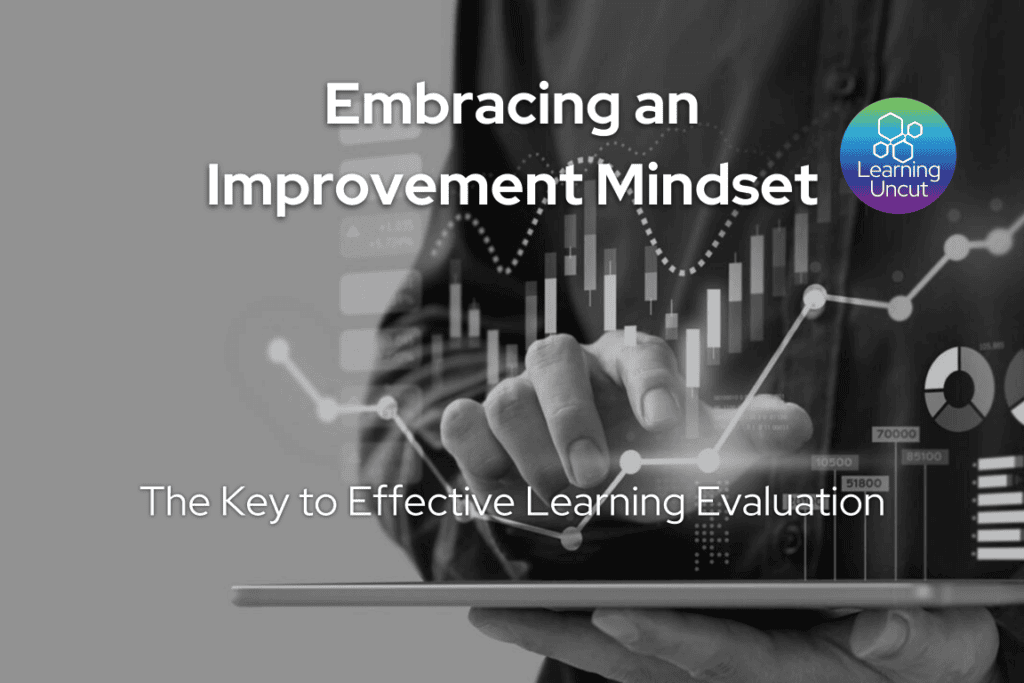In mid 2019 I wrote the following about the learning profession:
“The profession is divided. Some are highly capable and progressive. Many are unable to manage their own learning, let alone enable others to learn and perform better.”
Reading this statement two and a half years later I wonder if I was a little harsh, or if my view has changed. Perhaps covid provided the burning platform we needed to significantly uplift learning and development (L&D) capability in organisations.
I get to work with very progressive learning leaders and their teams, supporting them on their journey to transform learning in their organisation. Thanks to my podcast, Learning Uncut, I speak with learning professionals from around the globe about high impact projects, solutions, and approaches that they have developed and adopted. I am fortunate to be constantly exposed to examples of good practice. This generally makes me optimistic for the future of the profession.
Unfortunately, industry data tells a different story. Overall progress on shifting L&D capability remains too slow. Alarmingly, the skillset in learning teams has continued to contract relative to requirements. While it’s a little busy, the graphic from the 2021 Learning Performance Benchmark clearly conveys this contraction. Out of necessity virtual facilitation skills improved during the covid era. However, across the board the capability decline has continued.

The profession is still falling behind where it needs to be. The most significant gaps – actually, chasms – are in three key areas, with 30% or fewer of L&D teams reporting that they have these capabilities:2
- performance and business impact – performance consulting, analytics and data management.
- supporting learning – facilitating social/collaborative learning, learning in the flow of work
- digital skills – digital content development, technology/infrastructure
These skills are critical for L&D to remain relevant and meet the needs of their organisations and expectations of today’s workforce. The Great Resignation and tight talent market are exacerbating the pressure on L&D to effectively and efficiently upskill and reskill their workforce. Overall, learning professionals have been too slow to adapt to change, build capability, and adopt new approaches.
A Contemporary L&D Capability Map
In 2018 I led the refresh of the Learning and Performance Institute’s Capability Map.3 This map defines the skills required by a modern learning function. In the six years since initial publication the world of work changed significantly. Volatility and pace of change accelerated. Industry disruption and digital transformation became the norm. Workforces became more mobile, and work is done in more networked, agile ways. Data and Artificial Intelligence (AI) are used to personalise our everyday consumer experience.
The Capability Map was given a significant overhaul in response to these changes. Learning teams require a broader, more complex range of skills. The Capability Map contains 25 skills across five categories – strategy and operations, performance and impact, design and develop solutions, facilitate learning, and support learning. It’s clear that an individual or small learning team cannot be proficient in all 25 skills. Even larger teams may be daunted by the breadth of capability now required.
Fundamental Knowledge
In theory a learning professional knows more about how to learn than anyone else in an organisation. However, barriers to entry to learning roles are low. Too few are abreast of contemporary research.4 Debunked, out of date practices persist. The profession is divided. Some are highly capable and progressive. Many are unable to manage their own learning, let alone enable others to learn and perform better.
Fundamental knowledge is essential. Those unfamiliar with adult learning theory and lacking business acumen will fall by the wayside.
Specialisation and Interdependence
On top of this, specialisation is critical. Individuals require expertise in a small number of the skill categories in the Capability Map. They should choose wisely. Workplace learning is changing rapidly. While not disappearing, use of courses is shrinking. They are being supplanted by performance support in the flow of work. This will be powered by personalised, adaptive technology enabled by Artificial Intelligence and predictive analytics.
Recognise also that the learning function does not own learning culture. Additional capability can be accessed by collaborating with others. Groups such as Organisational Development, Innovation, Business Intelligence, Information Technology and leaders are key players in building learning culture. This is the ultimate destination – an organisation where learning, working and performing are intertwined. Such an organisation is sensitive and responsive to change and will thrive in today’s business environment.
Learning teams require a well-balanced mix of skilled specialists. I work with progressive teams to build capability specific to their organisation’s needs and vision for learning. Closing the gap invariably requires skill development.
Are you ready to be the Adult in the Room?
It’s time to challenge the mantra that no-one has time to learn. Learning professionals must be the adults in the room when it comes to development, starting with the own. Creating space to build learning team capability is deeply responsible. Leading by example signals to others that development is an important investment. An intensive, accelerated burst of development is now essential to leap the skills chasm.
The learning profession is at a critical juncture. Those who do not act now will become ineffective and irrelevant. Those who can leap the skills chasm will lead the profession to an extraordinary future. We have the potential to orchestrate success, being integral to how organisations adapt and thrive.
Do you or your team need to make the exponential leap required to bridge the skills gap?
Learning Uncut works with learning leaders and business leaders who see the potential of learning to make a bigger impact in their organisations. We guide learning teams to build capability, helping them to deliver real impact from learning through strategic insight, research and benchmarking. Find out more about our L&D Capability Building services on our website.
Learning Uncut welcomes contact from senior learning and business leaders who wish to harness learning and make it a key lever to achieve business results. Book your complementary thirty-minute call to start your conversation with us.
1 Innovate, Dominate or Decline. 2021 Annual L&D Benchmark Report, Mind Tools for Business, pg 20
2 Ibid, pg 23
3 Access the Learning and Performance Institute’s L&D Capability Map at https://www.thelpi.org/resources/capability-map/
4 34% of L&D professionals remain abreast of research – The Transformation Journey, Towards Maturity pg. 33


